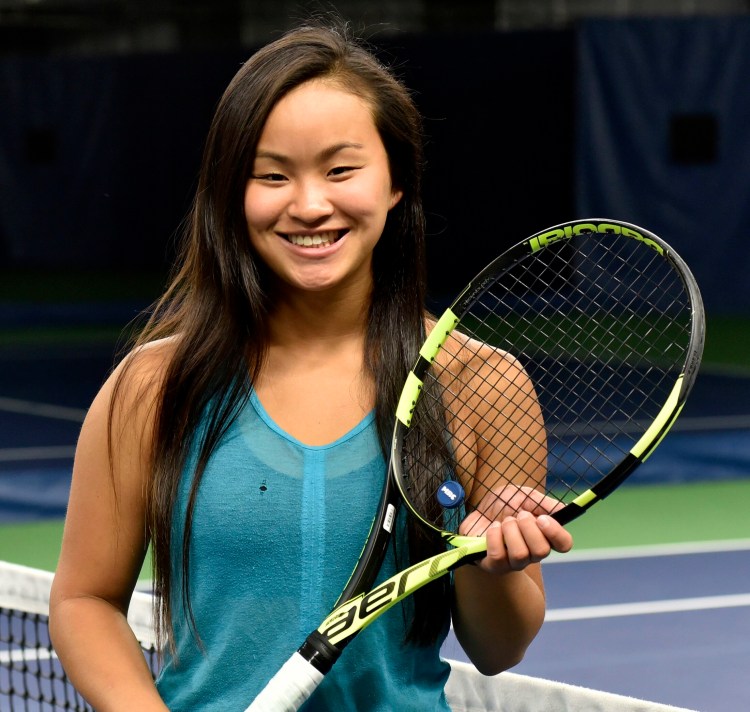Erskine Academy tennis coach Ryan Nored had seen Ellie Hodgkin play for three years. But in the very first match of the season, he saw something from his star senior he hadn’t seen before.
Hodgkin was playing well, and winning easily. And she was mad.
“She has this look on her face of just utter anger. Just vitriol,” Nored said. “(After the set) I said ‘OK, what’s going on?’ And her face changes in a second, she went back to happy. She goes ‘Oh, nothing. This is my new focus face.’ ”

Erskine Academy’s Ellie Hodgkins returns a shot during her No. 1 singles match against Lincoln Academy’s Caitlin Cass during the Class B state championship match this spring in Lewiston. Cass won the match, 6-3, 6-0, and Lincoln Academy won 5-0. Portland Press Herald file photo by Carl D. Walsh
The look worked well this season for Hodgkin, who guided the Eagles to the Class B final while making the Round of 16 in the state singles tournament. For her performance, Hodgkin is the Morning Sentinel Girls Tennis Player of the Year. Carrabec’s Makayla Vicneire, who helped the Cobras reach the Class C championship match, and Messalonskee’s Lauren Bourque were also considered.
“It couldn’t have gone better,” said Hodgkin, who went 12-0 during the regular season. “I’ve always wanted to be on a competitive team, and this year we were competitive. (I felt we were) going to be able to make it pretty far this year, and obviously we did. It was just awesome.”
To prepare for her senior season, Hodgkin changed up her training approach. After doing a lot of practicing and drilling in the seasons before, she played mostly matches this past offseason, including competitions against male players to get used to playing against harder, faster shots.
“I had to react faster to balls, I had to get into faster and bigger and more spinning serves,” she said. “Playing more matches than practicing definitely helped. It was getting to the point where I had the strokes, but I didn’t know the strategy in a match.”
By the time the season started, Nored saw a determined player, one who wanted both individual and team success. One of her goals was making up for what she felt was a lackluster showing in last year’s singles tournament, where she went out in the Round of 32.
“Her junior year wasn’t as good as she wanted, specifically in the singles tournament,” Nored said. “She really wanted 16.”
She got it. Hodgkin advanced to the Round of 32, then beat Deering’s Sarah Wriggins 4-6, 6-1, 1-0 (5) to accomplish her goal. Her run then ended with a 6-1, 6-1 loss to Cape Elizabeth’s Blair Hollyday, leaving Hodgkin with some disappointment at losing, but no regrets.
“I was happy to make it to the Round of 16, because that was my original goal, but I wanted to make it to the (quarterfinals) this year,” she said. “In the end, even though I lost, I’m happy I gave it everything I had.”
Hodgkin still had her goals for her team, which was enjoying a strong season and was beginning to feel confident it could be a championship contender.
“In our third match we had to play Waterville, and Waterville was a match that was going to decide how good we were,” she said. “We’d set Waterville as a high bar to beat, and once we beat Waterville, that was when we knew how good we were.”
Erskine ended up a third seed in the Class B North playoffs. The Eagles beat No. 6 Foxcroft 4-1, No. 2 Ellsworth 4-1 and No. 4 Waterville in a rematch 3-2 to reach the Class B final. Hodgkin went 3-0 in those matches, never even dropping a set.
Hodgkin was the leader of the team, though she said it took everyone taking on a piece of that leadership responsibility for the team to thrive.
“Our team is very special,” she said. “When we started winning, I did start to act as a leader. But then again, everyone else played a leadership role too, because I don’t think we would have done as well if we all hadn’t been a little bit of a leader.”
Nored, though, said there was something about his senior ace, who for each of her last three years led the charge in getting both the girls and boys teams’ players out for offseason practicing — and was responsible, he said, for turning Erskine into a team that hadn’t won a playoff match when she arrived into one that was a regional champion when she left.
“Had she not taken those girls, and hit with them in the offseason and convinced them to find their own motivation, we wouldn’t have had any chance,” he said. “Hands down, her biggest strength has been her encouraging the team and being that perfect captain that you would want as a coach.”
Send questions/comments to the editors.



